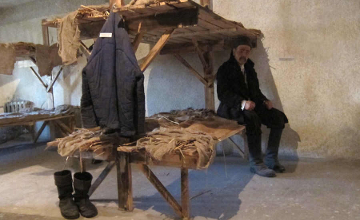ASTANA – The Kazakh-Spanish film “Los Olvidados de Karagandá” won an accolade in the Documentary Film Competition, receiving a diamond award of the California Film Awards 2014.
 The 50-minute documentary “Los Olvidados de Karagandá” or “The Forgotten of Karaganda”, directed by Yolanda Mendiola, tells the story of 152 Spaniards held during the later years of Stalin rule in a Soviet Labour Camp in Central Kazakhstan, part of the infamous GULAG system, who, despite having different political ideas, are united by the desire to survive.
The 50-minute documentary “Los Olvidados de Karagandá” or “The Forgotten of Karaganda”, directed by Yolanda Mendiola, tells the story of 152 Spaniards held during the later years of Stalin rule in a Soviet Labour Camp in Central Kazakhstan, part of the infamous GULAG system, who, despite having different political ideas, are united by the desire to survive.
“We believe that this story can be of great interest to researchers, the relatives and descendants of the people who were in these camps, and anyone interested in the recent history of our countries,” said Kazakhstan’s Ambassador to Spain Bakyt Dyussenbayev.
The project emerged as a result of Spanish Prime Minister Mariano Rajoy’s September 2013 visit to Kazakhstan, during which Kazakh President Nursultan Nazarbayev presented him with a list of the names of 152 Spaniards who were held in Stalin-era labour camps. Thus, Kazakhstan became the first Soviet successor state to carry out a formal transfer of archival documents to Spain. A project was implemented with the assistance of the Kazakh Foreign Ministry and the Asociacion Nexos-Alianza.
The film reflected records of eyewitnesses and elaborated on the circumstances leading to the capture of Spanish prisoners in KarLag (Karaganda Corrective Labour Camps), which was unknown until now to the majority of Spaniards.
Historically, the USSR supported the Republican cause in Spain’s Civil war of 1936-1939. Therefore, when the rightist Franco’s side prevailed, a number of Republicans and their families fled to the Soviet Union. However, many of them ended up imprisoned here as, disillusioned by real life in “communist paradise”, they spoke against Stalin and his totalitarian system.
At the same time, some of the Francoist Blue Division volunteers were captured by the Soviet Army while fighting alongside the Germans at the siege of Leningrad. The film showed ideological enemies meeting in the same camp and becoming allies, forgetting their differences for the sake of personal and collective survival.
The presentation of the documentary film in Madrid on Nov.18, 2014 received wide publicity. Kazakhstan’s Ambassador to Spain Dyussenbayev, Head of Television Española Jose Ramon Diez, President of the Asociacion Nexos-Alianza Enrique Gaspar, relatives and descendants of those camp victims and academics attended the event. A number of authoritative media outlets in Spain published positive articles about Kazakhstan’s gesture of friendship and the fates of families confined in camps in Kazakhstan.
“Personally I think this was a moment of reconciliation between Spaniards and Kazakhs. People from Kazakhstan and Spain communicated with each other on a human level, not through their governments,” Gaspar, president of the Asociacion Nexos-Alianza, stated.
“What is surprising is how they coexisted,” Gaspar said, adding that the prisoners’ “goal was to survive, return to Spain. As a result they forgot their ideologies.”
Referring to the aim of the film, the creators also underlined advancing cultural relations between the two states. This “is a work that seeks to fundamentally enrich the ties between the peoples of Kazakhstan and Spain,” it was said at the presentation.
Bilateral relations “do not only consist of official acts, ceremonial and political and economic issues, they also include every human and beautiful projects like the one we are presenting today,” Dyussenbayev added.
